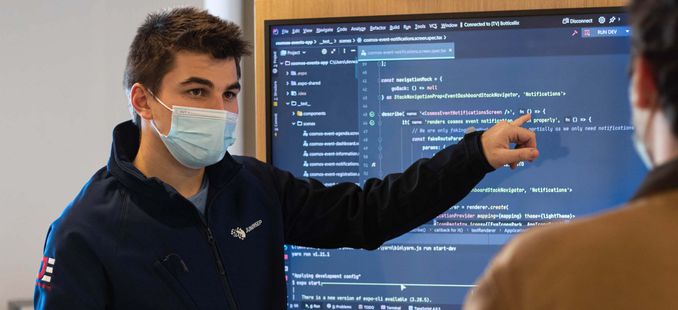
The need for digital skills is constantly growing – Turku UAS is involved in developing the skills of teachers and students
The need for digital marketing experts has arisen both in working life and in universities. The channels and methods of the digital market are always changing, which is why teachers in the field are also facing a new issue: what kind of skills does working life need and how do universities produce more of these skills?
Text: Veera Laaksonen
Digital competence and customer understanding will be emphasized as services move online, which is why these skills will be needed in all fields, believes Kai Schleutker, Senior Lecturer in business education and research projects.
Schleutker is the liaison for the DEMS – Developing e-Skills for the Business Market project, which was launched at the beginning of the year and works with European university partners to encourage digital teachers to internalize new marketing methods. The aim is to lower the digital threshold for teachers and create new digital marketing courses for students in the field.
– In order to provide students with the digital marketing skills that companies need, we must first train the teaching staff. This is an excellent opportunity for the teaching staff to develop themselves and their own skills, Schleutker says.
The first phase of the project will identify the digital marketing skills needed in the labour market, especially in SMEs. To this end, the survey will be targeted at around 200 SMEs in all partner countries – in addition to Finland, Portugal, the Netherlands and the coordinating country Poland. Politecnico Porto, HU Utrecht and GTU Gdansk are involved in the project.
Specific objectives
Turku University of Applied Sciences has the role of a pedagogical expert in the project, where it develops methods suitable for everyone for understanding the digital market and operating in the field. The project will form four five-credit periods, which will be piloted by teachers in the field during the coming academic year.
– In the pilot, we will find out how these new courses work and at the same time offer teachers opportunities to learn and further develop the courses, Schleutker explains.
Based on the needs of companies, themes that are becoming increasingly important in working life are found and verified. According to Schleutker, the focus will be on creating digital visibility and customer contacts on websites and social media, content production, and the increasing use of analytics and artificial intelligence.
Schleutker and the others working on the DEMS project at Turku University of Applied Sciences have sought to follow the changing trends in marketing in their own teaching activities, in order to be able to teach their students work-related skills in their own work. Such an approach is now being sought more widely in the project.
– Turku University of Applied Sciences is a pioneer in innovation pedagogy in Europe, which is why our role in this project is to develop new teaching methods.
The courses piloted in the project will be offered to students in the academic year 2023–24, when the first Europe-wide Digital Marketing student team competition will also be held.
According to Schleutker, the aim is that these courses could also be offered, for example, as optional studies for students in other fields, such as IT engineers and industrial engineers. They could also be placed in the Open Studies course selection and the CampusOnline service.
The project is part of the Entrepreneurship and Value Creation research group, and its funding comes from the Erasmus + Partnership programme.
More about the research group:
The basic idea of the research group is based on an extensive view on entrepreneurship as internal, independent, external and organizational entrepreneurship. In particular, the activities of the research group are focused on entrepreneurship, entrepreneurial ways of action, developing the operations of different enterprises, life-long learning, development and innovation of value creation, which brings together enterprises, customers, and other stakeholders.
